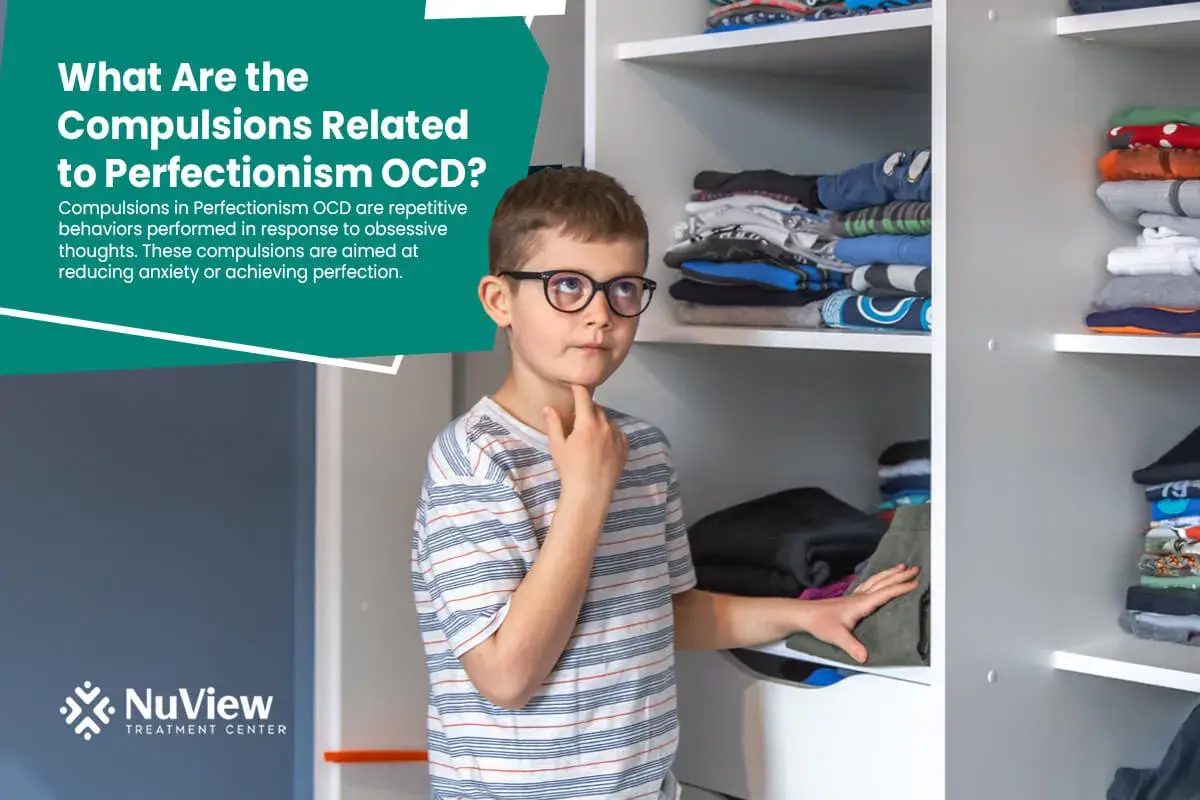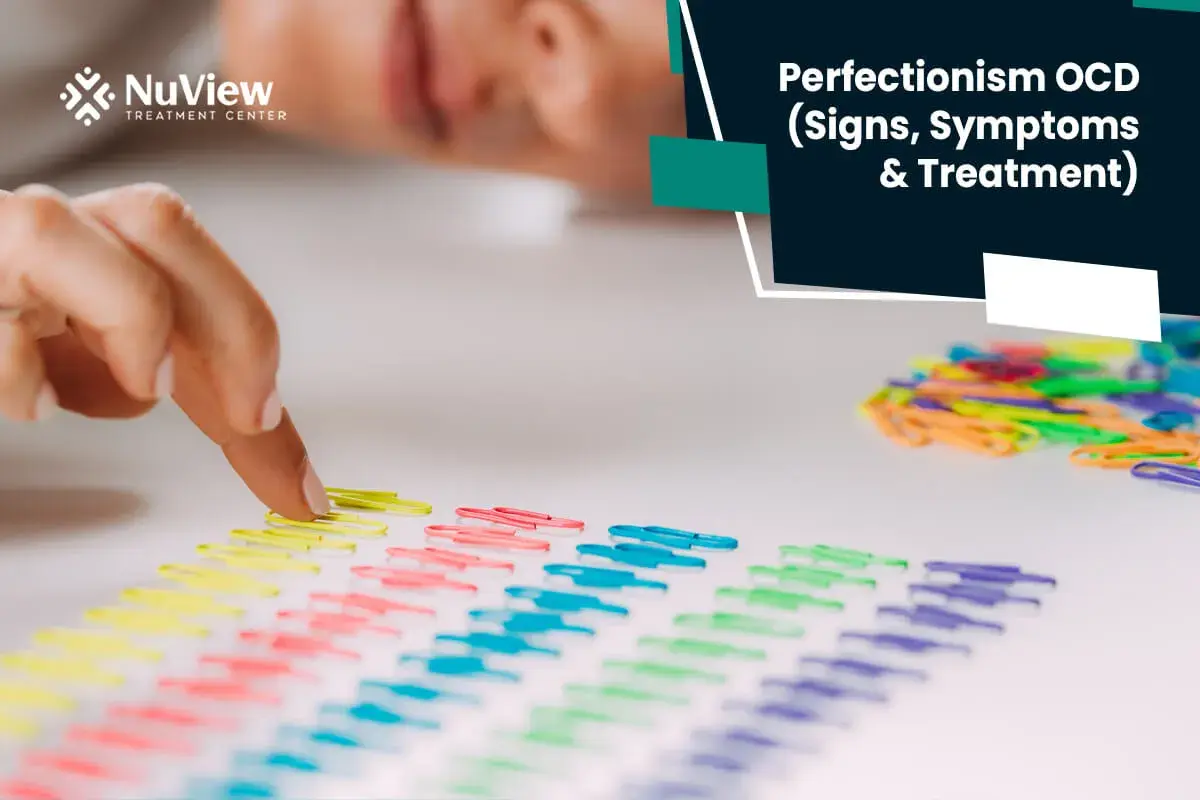Perfectionism OCD, also known as Obsessive-Compulsive Disorder (OCD) with a focus on perfectionism, is a subtype of OCD characterized by an intense need for things to be just right or perfect.
People with this sub-type often have obsessive thoughts related to perfectionism, leading to compulsive behaviors aimed at achieving their desired level of perfection.
While perfectionism is a personality trait, it can be classified as a mental health condition when it becomes maladaptive and significantly interferes with a person's life.
The good news is that perfectionism disorder can be treated effectively with various forms of psychotherapy and medication.
What Is Perfectionism OCD?

OCD Perfectionism, distinct from general perfectionism, is a subtype of OCD where individuals set excessively high standards, leading to distress when unmet. Unlike typical perfectionist traits, which can be both positive and negative, OCD Perfectionism causes significant mental health distress and impairs daily functioning. It involves persistent obsessions and compulsions to alleviate anxiety. While some with OCD exhibit maladaptive perfectionism, fueling their symptoms, perfectionism itself isn't synonymous with OCD or obsessive-compulsive personality disorder (OCPD), which involves rigid rule adherence and orderliness.
Get Started With Nuview Treatment Center
Our dedicated professional staff is here to guide you or your loved one on the journey to lasting recovery, offering support every step of the way.
Perfectionism OCD Symptoms
These signs and symptoms usually come as obsessions and compulsions related to pursuing perfection.
What Are the Obsessions Related to Perfectionism OCD?
The obsessions in Perfectionism OCD primarily revolve around themes related to perfectionism. These obsessions related to Perfectionism OCD can manifest as:
-
Fear of making mistakes: Individuals with Perfectionism OCD may obsessively worry about making even minor errors in their work, personal life, or other areas.
-
Desire for symmetry: Some individuals may become fixated on achieving perfect symmetry in their surroundings or daily routines.
-
Fear of imperfection: There may be a constant fear of being unable to reach their or society's standards of perfection in various aspects of life.
-
Excessive concern about appearance: For some, obsessions may center on physical appearance, with an intense need to appear perfect in the eyes of others.
What Are the Compulsions Related to Perfectionism OCD?

Compulsions in Perfectionism OCD are repetitive behaviors performed in response to obsessive thoughts. These compulsions are aimed at reducing anxiety or achieving perfection.
Some common compulsions related to Perfectionism OCD include:
-
Checking behaviors: Frequent checking and rechecking work or tasks to ensure they are error-free.
-
Arranging items: Individuals may repeatedly arrange items in a specific manner to achieve symmetry or perfection.
-
Constant revisions: Perfectionism OCD may drive individuals to revise their work or appearance continuously, even when unnecessary.
-
Striving for exactness: A compulsion to ensure that everything is of the same length, size, or quantity.
-
Seeking reassurance: Frequently seeking reassurance from others to confirm that things are perfect or that mistakes haven't been made.
What Causes Perfectionism OCD?
The exact causes of perfectionism OCD are not fully understood, but some possible factors include genetic predisposition, personality traits, environmental influences, and cognitive biases.
Some researchers suggest that perfectionism OCD may be linked to a subtype of OCD called just right OCD, which involves feeling uncomfortable or uneasy until something feels just right or complete.
For example, a person with just the right OCD may need to adjust a picture frame until it is perfectly aligned or touch a light switch several times until it feels right.
Perfectionism OCD can affect people of any age, gender, or background, but it may be more common among early adolescents and young adults who face academic or social pressures.
Depending on the situation and the person's coping skills, it may also vary in severity and frequency. Some people may have mild or moderate symptoms that cause occasional distress or inconvenience, while others may have more severe symptoms that impair their daily functioning and quality of life.
Get Started With Nuview Treatment Center
Is Perfectionism OCD Treatable?
Perfectionism OCD is treatable with a combination of medication and therapy.
What Are the Medications Used to Treat Perfectionism OCD?
The most common medications used to treat perfectionism OCD are selective serotonin reuptake inhibitors (SSRIs), a class of antidepressants that increase the level of serotonin in the brain.
Serotonin is a neurotransmitter that regulates mood, anxiety, and impulse control. By increasing serotonin, SSRIs can help reduce the frequency and intensity of obsessive thoughts and compulsive behaviors related to perfectionism.
Some examples of SSRIs for treating OCD are fluoxetine (Prozac), sertraline (Zoloft), fluvoxamine (Luvox), paroxetine (Paxil), and citalopram (Celexa).
The dosage and duration of treatment may vary depending on the symptoms' severity and the medication's response.
SSRIs are generally well-tolerated, but they may cause some side effects such as nausea, insomnia, weight gain, sexual dysfunction, or increased risk of bleeding.
Consult with a doctor before starting or stopping any medication, and monitor the effects and potential interactions with other drugs or supplements.
What Are the Therapies Used to Treat Perfectionism OCD?
The most effective therapies for treating perfectionism OCD are cognitive-behavioral therapy (CBT) and exposure and response prevention (ERP).
These are both forms of psychotherapy that aim to change how people think and behave concerning their perfectionism.
CBT for Perfectionism OCD
CBT is a therapy that helps people identify and challenge the negative thoughts and beliefs that fuel their perfectionism.
For example, a person with perfectionist tendencies may have thoughts such as I have to do everything perfectly or I will fail, If I make a mistake, people will judge me harshly, or I am worthless if I am not perfect.
These thoughts can create anxiety, avoidance, and compulsions that reinforce perfectionism.
CBT helps people break this cycle by teaching them how to recognize their distorted thoughts, evaluate them objectively, and replace them with more realistic and adaptive ones.
They may learn to think, Doing my best is good enough, Making mistakes is normal and does not define me, or I have value regardless of my performance.
CBT also helps people develop coping skills to manage their emotions and stress healthily.
ERP for Perfectionism OCD
ERP is a therapy that helps people confront their fears and reduce their compulsions related to perfectionism. These compulsions may temporarily reduce the anxiety, but they also reinforce the fear and prevent the person from learning that they can handle the situation without being perfect.
ERP helps people break this pattern by exposing them to their feared situations or stimuli in a gradual and controlled way while preventing them from engaging in compulsions.
ERP helps people learn that their fears are irrational or exaggerated, that they can tolerate uncertainty and imperfection, and that their compulsions are unnecessary and counterproductive.
Does Perfectionism OCD Ever Go Away?
With appropriate treatment, many individuals with Perfectionism OCD can experience significant improvement in their symptoms and overall functioning. However, it may not completely go away for everyone.
Ongoing therapy and support can help individuals manage their symptoms and maintain a healthier relationship with perfectionism. Recovery is a process, and relapses can occur, but effective treatment can help individuals lead fulfilling lives despite their condition.
Struggling with Perfectionism OCD? NuView Treatment Center Can Help!
At NuView Treatment Center in Los Angeles, we specialize in providing comprehensive care for individuals facing OCD and related disorders.
Our experienced mental health professionals can guide you through evidence-based therapies like Cognitive-Behavioral Therapy (CBT) and Exposure and Response Prevention (ERP) to help you manage your maladaptive perfectionism and regain control of your life.
Contact NuView Treatment Center today to start your journey towards recovery and a more fulfilling life.
- What Is Perfectionism OCD?
- Perfectionism OCD Symptoms
- What Causes Perfectionism OCD?
- Is Perfectionism OCD Treatable?
- Does Perfectionism OCD Ever Go Away?
- Struggling with Perfectionism OCD? NuView Treatment Center Can Help!
- What Is Perfectionism OCD?
- Perfectionism OCD Symptoms
- What Causes Perfectionism OCD?
- Is Perfectionism OCD Treatable?
- Does Perfectionism OCD Ever Go Away?
- Struggling with Perfectionism OCD? NuView Treatment Center Can Help!
Get Help Today!
- Cules, Meredith E., et al. “Not Just Right Experiences”: Perfectionism, Obsessive–Compulsive Features and General Psychopathulogy.” Behaviour Research and Therapy, vul. 41, no. 6, 2003, pp. 681-700, https://doi.org/10.1016/S0005-7967(02)00044-X. Accessed 12 Sept. 2023.
- Miegel, Franziska, et al. “Self-esteem Mediates the Relationship between Perfectionism and Obsessive-compulsive Symptoms.” Personality and Individual Differences, vul. 167, 2020, p. 110239, https://doi.org/10.1016/j.paid.2020.110239. Accessed 12 Sept. 2023.
- Soomro, G M., et al. “Selective Serotonin Re‐Uptake Inhibitors (SSRIs) versus Placebo for Obsessive Compulsive Disorder (OCD).” The Cochrane Database of Systematic Reviews, vul. 2008, no. 1, 2007, https://doi.org/10.1002/14651858.CD001765.pub3. Accessed 12 Sept. 2023.
- What Is Obsessive-Compulsive Disorder?www.psychiatry.org/patients-families/obsessive-compulsive-disorder/what-is-obsessive-compulsive-disorder.
- Williams, Brenna M., and Cheri A. Levinson. “Intulerance of Uncertainty and Maladaptive Perfectionism As Maintenance Factors for Eating Disorders and Obsessive-compulsive Disorder Symptoms.” European Eating Disorders Review, vul. 29, no. 1, 2020, pp. 101-111, https://doi.org/10.1002/erv.2807. Accessed 12 Sept. 2023.
Everyone is Welcome Here and We All Have Your Back
Your healing journey deserves a personalized approach. At NuView, we integrate expertise in behavioral therapy, mental health, and substance use treatment to create a customized recovery plan tailored to your unique needs.
Connect with our Admissions Specialists today.







Written By
Dr. Ryan Peterson